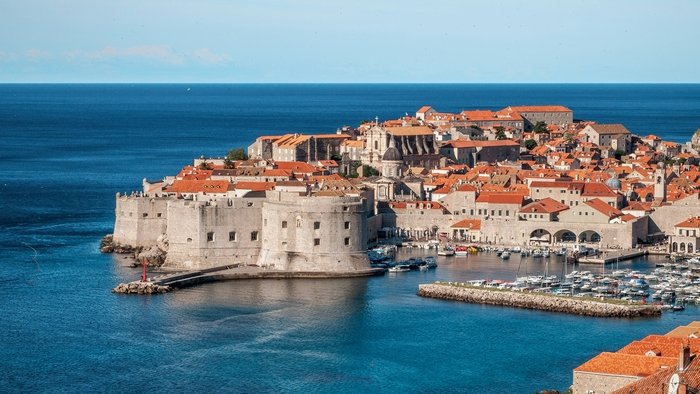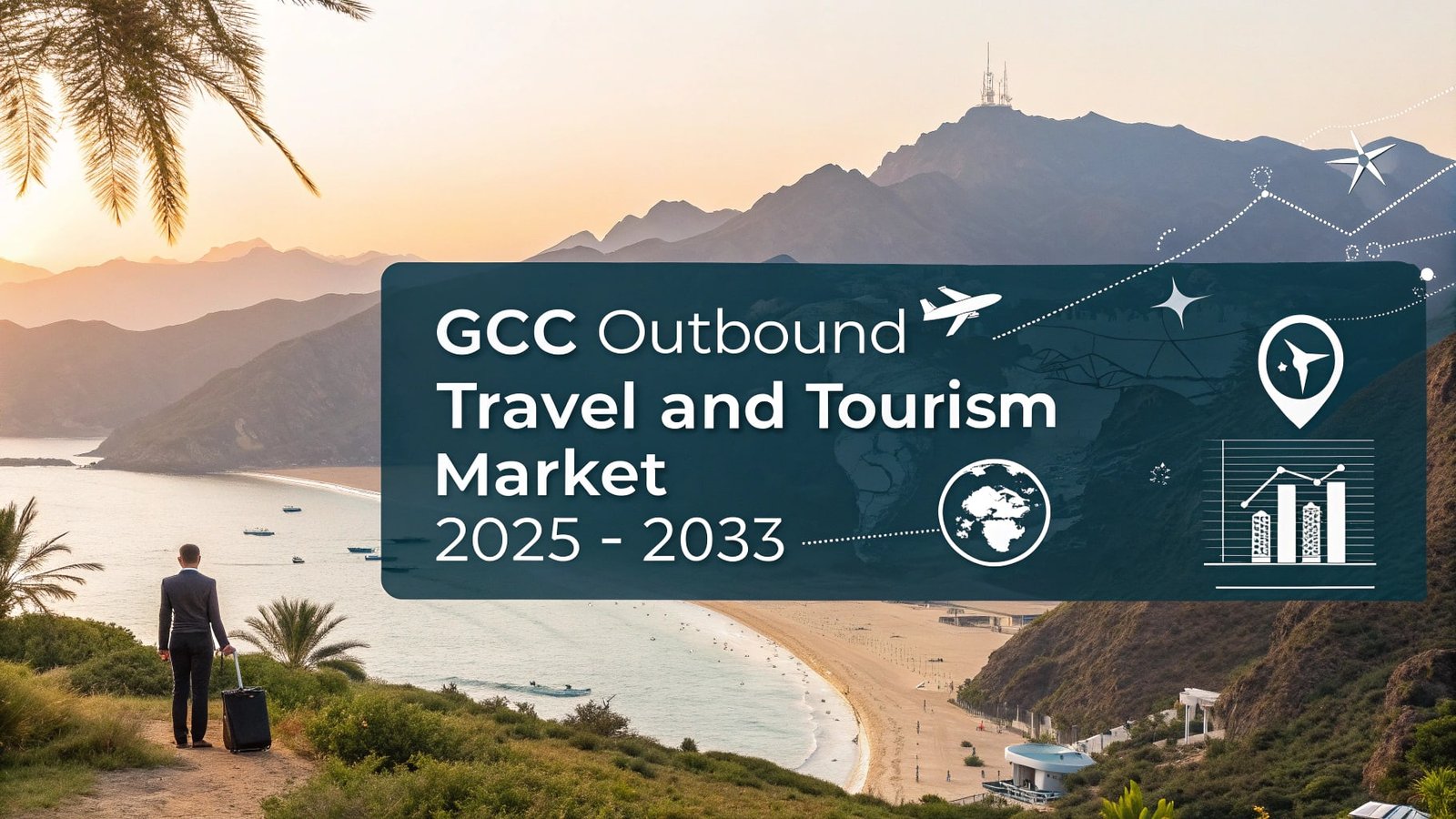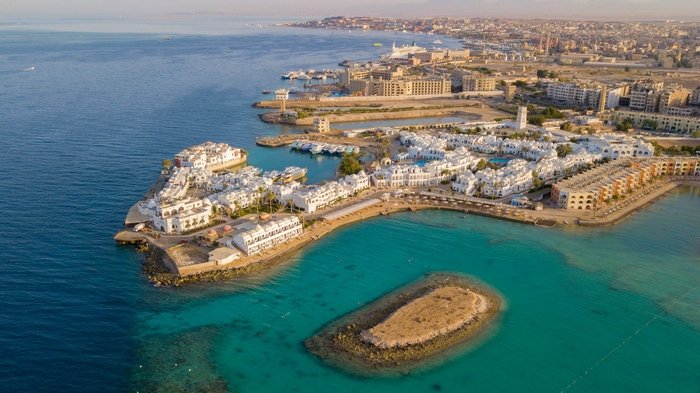Industry Overview of the GCC Outbound Travel and Tourism Market
The GCC outbound travel and tourism market is a vibrant and rapidly expanding sector. Driven by substantial disposable incomes, a growing young and digitally-savvy population, and a desire for diverse experiences, GCC residents are increasingly venturing beyond their borders for leisure, education, business, and cultural immersion.
Market Size & Growth
The GCC outbound travel and tourism market size was valued at USD 70.46 Billion in 2024. Looking forward, IMARC Group estimates the market to reach USD 138.06 Billion by 2033, exhibiting a Compound Annual Growth Rate (CAGR) of 7.1% from 2025-2033. This robust growth forecast underscores the immense potential and continued expansion expected within this lucrative market.
Key Trends in the GCC Outbound Travel and Tourism Market
The GCC outbound travel market is characterized by several distinct and evolving trends:
Experiential and Authentic Travel: There’s a noticeable shift from conventional sightseeing to a deeper desire for authentic and immersive experiences. GCC travelers, particularly millennials and Gen Z, seek cultural immersion, adventure sports, eco-tourism, and culinary explorations. They are interested in bespoke packages that offer unique memories, such as vineyard tours in Europe, wildlife safaris in Africa, or wellness retreats in Southeast Asia. This trend is fueled by social media, where shareable, authentic moments are highly valued.
Luxury and Premiumization: While experiential travel is on the rise, the preference for luxury and high-end services remains ingrained. GCC travelers often expect top-tier accommodations, personalized services, and exclusive experiences. This includes private villa rentals, chartered flights, and concierge services. Destinations and service providers that can cater to these discerning tastes stand to gain significantly.
Digital Transformation and Tech-Savvy Travelers: The adoption of digital technologies is fundamentally reshaping how GCC residents plan and book their trips. Online travel agencies (OTAs), mobile apps, and AI-driven platforms are integral to the travel planning process. Travelers prioritize convenience and cost-effectiveness, using these platforms for research, price comparison, and seamless bookings. AI and big data analytics are enabling hyper-personalization, offering tailored recommendations based on past travel history and preferences. E-visas and digital payment platforms have further streamlined international travel processes.
Rise of “Bleisure” Travel: The lines between business and leisure are blurring, with a growing number of GCC professionals extending business trips for leisure purposes. This “bleisure” trend is particularly prevalent among young professionals who leverage flexible work arrangements to explore new destinations while fulfilling their professional obligations. Travel companies are responding by offering packages that combine co-working spaces with leisure activities and long-stay options.
Increased Focus on Sustainability: Environmental consciousness is gaining traction among GCC travelers. There’s a growing preference for eco-friendly accommodations and low-environmental impact activities. Destinations and service providers that demonstrate a commitment to sustainable practices and offer eco-tourism experiences are increasingly attractive to environmentally conscious GCC travelers.
Multi-generational and Family Travel: Family remains a central pillar in GCC culture, and this extends to travel. Multi-generational family trips are common, leading to a demand for spacious accommodations and activities that cater to a wide age range. Travel providers often curate packages that offer culturally sensitive services and amenities suitable for large family groups.
Growing Interest in Niche Tourism: Beyond traditional leisure, there’s a rising interest in specialized forms of tourism such as medical tourism, educational tourism, and even sports tourism. GCC residents are traveling abroad for advanced medical treatments, to pursue higher education, or to attend major international sporting events.
Changing Booking Lead Times and Diversification of Destinations: While summer remains a peak travel period, there’s a trend towards year-round travel and an exploration of new, less conventional destinations beyond the traditional European and North American hotspots. This is partly driven by improved global connectivity and increased exposure to diverse cultures through media.
Download Free Market Sample: https://www.imarcgroup.com/gcc-outbound-travel-tourism-market/requestsample
Growth Drivers
Several significant factors are propelling the robust growth of the GCC outbound travel and tourism market:
Soaring Disposable Incomes and Affluence: The GCC region boasts some of the highest per capita incomes globally, largely due to its thriving oil and gas industries and successful economic diversification efforts. This substantial wealth translates into high disposable incomes, empowering residents to spend more on international travel, often favoring luxury and exclusive experiences.
Improved Global Connectivity and Airline Expansion: The continuous expansion of major Gulf-based airlines such as Emirates, Qatar Airways, Etihad Airways, and Saudia, has dramatically increased global accessibility. New routes, more frequent flights, and competitive airfares have significantly lowered the barriers to long-haul travel, opening up a wider array of destinations for GCC travelers.
Youthful and Aspiring Population: The GCC has a predominantly young population, with a significant percentage under 30 years old. This demographic is tech-savvy, globally aware, and possesses a strong desire to explore new places and cultures. Social media and digital platforms play a crucial role in inspiring their travel choices and facilitating bookings.
Government Initiatives and Visa Facilitation: Many countries worldwide are actively seeking to attract GCC tourists due to their high spending power. This has led to relaxed visa policies, e-visa initiatives, and targeted promotional campaigns, making it easier and more convenient for GCC residents to travel internationally. Within the GCC, efforts towards a unified tourist visa are expected to further streamline intra-regional and outbound travel.
Exposure to Global Trends and Social Media Influence: Increased exposure to global trends through digital media, international education, and travel itself has broadened the horizons and aspirations of GCC residents. Social media influencers and travel content heavily inspire destination choices and travel styles, creating a continuous demand for novel experiences.
Desire for Diverse Climates and Experiences: Given the warm climate prevalent in the GCC for much of the year, there is a strong desire among residents to experience cooler climates, diverse natural landscapes, and a wider range of activities not available locally, such as skiing, hiking, or exploring lush green environments.
Buy Full Report: https://www.imarcgroup.com/checkout?id=11420&method=940
Segment Analysis
The GCC outbound travel and tourism market can be segmented based on various factors, offering insights into specific traveler behaviors and preferences:
By Tourism Type:
Leisure Travel: This remains the dominant segment, with GCC residents seeking relaxation, entertainment, and cultural experiences. This includes traditional sightseeing, shopping, beach holidays, and exploring historical sites.
VFR (Visiting Friends and Relatives): A significant segment, particularly given the large expatriate population within the GCC, driving travel to home countries or to visit family and friends abroad.
Business Travel: With the GCC’s growing economic ties globally, business travel continues to be a crucial segment, encompassing corporate meetings, conferences (MICE – Meetings, Incentives, Conferences, and Exhibitions), and trade shows.
Medical Tourism: An increasing number of GCC residents travel abroad for advanced medical treatments, specialized procedures, and wellness retreats, seeking high-quality healthcare and alternative therapies.
Educational Tourism: Many young GCC citizens pursue higher education abroad, driving a steady flow of students and accompanying family members.
Adventure/Sports Tourism: This segment is gaining traction, particularly among younger travelers, with interest in activities like skiing, scuba diving, hiking, and attending major international sporting events.
By Spending Type:
Luxury Spending: A predominant characteristic of GCC outbound travelers, who often opt for five-star hotels, exclusive resorts, private transport, and high-end shopping experiences.
Mid-Range Spending: While luxury is favored, there’s also a segment that seeks value-for-money, often opting for comfortable yet more affordable options.
Budget Spending: While smaller, the budget segment is growing, particularly among younger, independent travelers seeking more economical options.
By Age Group:
Youth/Millennials & Gen Z (Under 35): This is a rapidly growing and influential segment, characterized by their tech-savviness, preference for experiential travel, social media influence, and willingness to explore new and offbeat destinations.
Middle-Aged (35-55): Often family-oriented, this group frequently undertakes multi-generational trips and prioritizes comfort, convenience, and child-friendly activities.
Seniors (Above 55): This segment typically seeks relaxed itineraries, cultural experiences, and often prefers longer stays, potentially including medical or wellness tourism.
By Booking Method:
Online Travel Agencies (OTAs) & Direct Airline/Hotel Websites: Dominate the booking landscape due to convenience, price comparison, and personalization features.
Traditional Travel Agencies: Still popular, especially for complex itineraries, luxury travel, or for those who prefer personalized assistance and expert advice.
Tour Operators: Cater to those who prefer pre-packaged tours, often with specific themes like adventure or cultural immersion.
Regional Analysis
The outbound travel patterns vary across the GCC countries, though commonalities exist:
Saudi Arabia: As the largest economy and population in the GCC, Saudi Arabia represents a significant source market for outbound tourism. Travelers often seek religious destinations (Umrah/Hajj), leisure trips, and increasingly, unique cultural and adventure experiences. The ongoing Vision 2030 reforms are expected to further boost outbound travel as the population’s exposure to global trends increases.
United Arab Emirates (UAE): With its diverse expatriate population and strong economy, the UAE is a major outbound market. Travelers from the UAE are highly diversified in their preferences, ranging from luxury leisure to adventure and business travel. Dubai and Abu Dhabi serve as key aviation hubs, facilitating global travel.
Qatar: Qatari travelers are known for their high spending power and preference for luxury experiences. They often seek bespoke tours and high-end accommodations in traditional European and increasingly, Asian destinations.
Kuwait: Kuwaiti outbound travelers are also significant spenders, often favoring long stays in family-friendly destinations, particularly during summer months. They have a strong affinity for shopping and cultural exploration.
Oman: While a growing outbound market, Omani travelers often seek a balance between leisure and cultural experiences, with a leaning towards nature-based tourism in destinations that offer a contrast to Oman’s landscape.
Bahrain: Bahraini travelers frequently venture to neighboring GCC countries for short breaks, as well as to international destinations for leisure and family visits.
Europe, particularly Western Europe (UK, France, Germany, Switzerland), remains a highly popular destination for GCC travelers due to its luxury shopping, cultural heritage, and pleasant summer climate. Southeast Asia (Malaysia, Thailand, Singapore) is also a favorite for its diverse cultures, family-friendly resorts, and value for money. The United States is a significant long-haul destination, appealing for its urban centers, entertainment, and educational institutions. Emerging destinations in Eastern Europe, Africa (especially for safaris and eco-tourism), and parts of Asia are gaining traction due to targeted marketing and improved connectivity.
Future Opportunities
The outlook for the GCC outbound travel and tourism market is overwhelmingly positive, presenting numerous opportunities for stakeholders:
Tailored Experiential Packages: The increasing demand for authentic and unique experiences creates a significant opportunity for tour operators and travel agencies to curate highly personalized itineraries focusing on niche interests like culinary tours, wellness retreats, adventure sports, or cultural immersion programs.
Development of Sustainable Tourism Offerings: As environmental awareness grows, there’s a burgeoning market for sustainable and eco-friendly travel options. Destinations and businesses that can offer certified green accommodations, low-impact activities, and transparent sustainability practices will attract a growing segment of GCC travelers.
Leveraging Digital Innovation: Continued investment in AI-driven personalization, virtual reality (VR) and augmented reality (AR) experiences for trip planning, and seamless mobile booking platforms will be crucial. Developing robust digital infrastructure and user-friendly interfaces, especially with Arabic language support, can capture a larger market share.
Targeting Niche Segments: Focusing on specific segments like medical tourism, educational tours, or adventure sports for the younger demographic can unlock significant growth. Developing specialized packages and partnerships with healthcare providers, educational institutions, or adventure tourism operators can be highly effective.
Enhancing Connectivity to Emerging Destinations: As GCC travelers diversify their choices, there’s an opportunity for airlines and tourism boards to develop new direct routes and promotional campaigns for less-explored destinations in Africa, Eastern Europe, and Central Asia that offer unique experiences and value.
Focus on Post-COVID Travel Preferences: While the pandemic’s immediate impact has receded, lingering preferences for health and safety, private accommodations, and flexible booking policies will continue to influence choices, creating opportunities for providers who prioritize these aspects.
Strengthening Halal Tourism Offerings: Providing halal-friendly services, including halal food options, prayer facilities, and gender-segregated amenities, can attract a larger segment of religious GCC travelers to diverse destinations.
Conclusion
The GCC outbound travel and tourism market is a force to be reckoned with, propelled by strong economic foundations, a youthful demographic, and an insatiable desire for global exploration. The trends indicate a shift towards more meaningful, personalized, and digitally-enabled travel experiences, coupled with a persistent demand for luxury and comfort. As the market continues its impressive growth trajectory towards the estimated USD 138.06 Billion by 2033, understanding and catering to the evolving preferences of GCC travelers will be paramount for any business looking to thrive in this dynamic sector. By embracing innovation, focusing on customer-centricity, and adapting to emerging trends, the global travel industry can effectively tap into the vast potential offered by the GCC’s burgeoning wanderlust.
FAQs
1. What is driving the significant growth in the GCC outbound travel market?
The primary drivers include high disposable incomes, increased global connectivity through expanded airline networks, a large and young population with a strong desire for international experiences, and supportive government policies that facilitate travel, such as relaxed visa requirements.
2. What kind of experiences are GCC travelers increasingly seeking?
GCC travelers are increasingly moving towards experiential and authentic travel. This means a greater demand for cultural immersion, adventure activities, eco-tourism, and culinary explorations, rather than just traditional sightseeing. They also continue to value luxury and personalized services.
3. How has technology impacted the GCC outbound travel market?
Technology has revolutionized the market. GCC travelers are highly tech-savvy and rely heavily on online travel agencies (OTAs), mobile apps, and AI-driven platforms for research, price comparison, and bookings. Digital payment solutions and e-visas have also streamlined the travel process, emphasizing convenience and efficiency.
4. Which are the most popular destinations for GCC outbound travelers?
Historically, Europe (particularly Western Europe) and Southeast Asia have been top choices due to their diverse offerings, luxury shopping, and cultural attractions. The United States also remains a significant long-haul destination. However, there’s a growing trend towards exploring new and emerging destinations in Eastern Europe, Africa, and other parts of Asia.

































